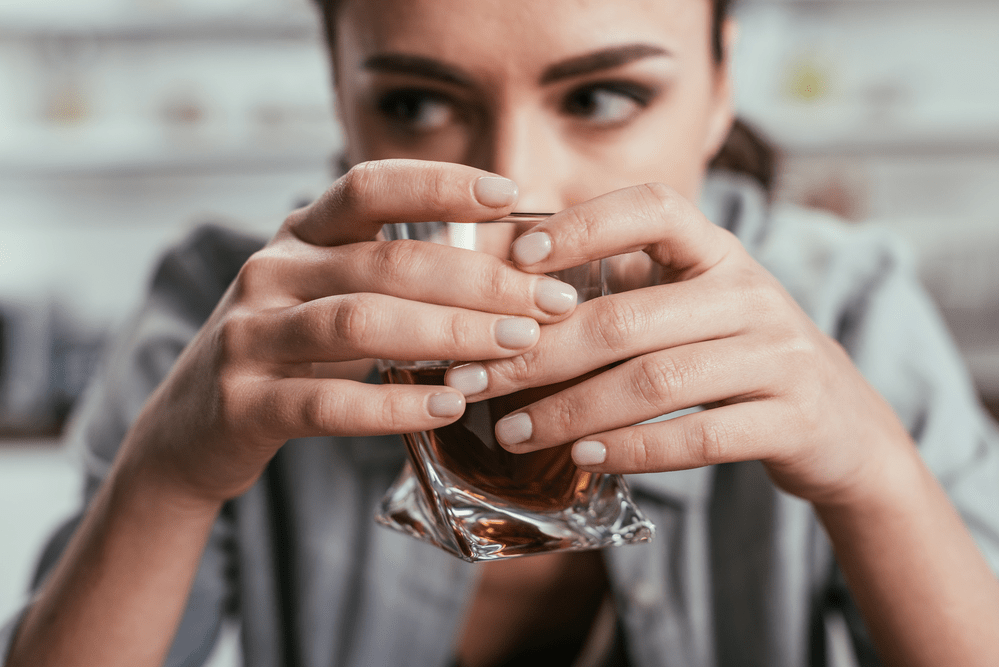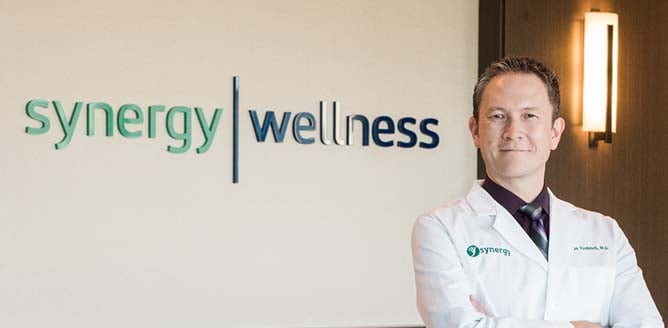
Alcohol addiction will damage your relationships with your loved ones and harm your ability to perform your duties at work and at home. In addition, excessive drinking can cause you to develop a number of serious health issues. Fortunately, you don’t have to handle your addiction on your own. At Synergy Wellness in Bakersfield, California, we have a variety of outpatient programs that can help you gain control over your relationship with alcohol.
Alcohol Addiction FAQs: How Many Drinks a Day Is Considered an Alcoholic?
There’s no set number of drinks that will make you an alcoholic, and your age, weight, genes, and other factors will affect how you respond to alcohol. That said, certain drinking habits may indicate that you have a problematic relationship with alcohol.
MODERATE DRINKING
According to the Center for Disease Control, also known as the CDC, a man engages in moderate drinking when he has two drinks of wine, beer, or hard liquor each day. A woman engages in moderate drinking when she has one drink a day. The size of a drink depends on the strength of the alcoholic beverage that is being consumed. A drink is usually defined as five ounces of wine, eight ounces of malt liquor, twelve ounces of beer, or one-and-a-half ounces of hard liquor.
HEAVY DRINKING
The CDC says that a man is a heavy drinker when he has twelve or more alcoholic drinks each week. A woman meets this threshold when she consumes eight or more drinks a week. Heavy drinking often, but not always, turns into problem drinking.
PROBLEM DRINKING
Problem drinking occurs when your alcohol consumption begins to create difficulties in your life. For example, your drinking might cause you to perform poorly at your work. You may also engage in risky, illegal behavior, such as driving a car or operating other types of machinery while you are under the influence of alcohol. These activities could lead to injuries and legal issues.
An inability to control your problematic drinking over a long period of time is an indication that you have an alcohol dependency. If you have addiction issues, you might repeatedly try and fail to cut down on your problematic drinking.
What Are the Signs of a Drinking Problem?
Since everyone is unique, people will express their alcohol addiction in different ways. For instance, some people might drink every day while others may engage in binges followed by long periods of sobriety. That said, there are a number of signs that indicate that a person has an addiction issue.
INABILITY TO STOP DRINKING
Failing to control your drinking is a sign that you have an addiction to alcohol. For instance, you may submit to your craving for a drink after you promised yourself that you would stay sober. At times, you might be able to stop drinking for a couple of weeks or even months. However, once you resume drinking, you will quickly return to your previous consumption level.
HIDING YOUR DRINKING
Hiding your drinking also indicates that you have a problem with alcohol. You might lie to your friends and family about your alcohol consumption. You might also conceal your stash of alcohol or take steps to discreetly dispose of your empty bottles. Further, you will probably isolate yourself from your loved ones so that you can spend time drinking by yourself.
DRINKING IN THE MORNING
When you have addiction issues, you might drink in the morning to mitigate the negative effects of a night of excessive drinking. Needing a morning drink to combat your nausea and stop your hands from shaking is a sign that you have an addiction to alcohol.
What Factors Increase My Risk of Developing Issues With Alcohol?
You don’t have to be a certain age, work in a specific profession, or have any other unique characteristics to develop an issue with alcohol. Addiction issues are very common, and at least 8% of the people in California have alcohol dependency issues. That said, there are some factors that will increase your chances of developing issues with alcohol.
MENTAL HEALTH
Mental health issues increase your risk of becoming dependent on alcohol. For instance, if you have anxiety or depression, you might drink to calm your nerves or improve your mood. Further, if you feel nervous when you are in social situations, you might drink too much at weddings, parties, and other gatherings. Over time, your excessive drinking at social functions can lead you to develop addiction issues.
GENETICS
Your genetics have a large influence on your risk of developing an addiction to alcohol. If people in your family struggle to control their use of alcohol or other drugs, you will have a higher chance of developing alcohol addiction.
SOCIAL CIRCUMSTANCES
Your friends and co-workers can impact your relationship with alcohol. For instance, if your friends do not drink very much, you might have an easy time moderating your alcohol use during social events. However, if alcohol is an integral part of your friends’ lives, you are likely to have more difficulty controlling your drinking. For example, if all of your friends drink heavily, you will feel pressured to follow their lead during social functions.
How Does Drinking Impact My Body?
In addition to harming your career and relationships, excessive alcohol consumption can damage your physical health.
IMMEDIATE EFFECTS
Drinking will cause immediate changes in your mood and behavior. When you have a single drink, you are likely to feel relaxed and confident. If you continue drinking, your reflexes and judgment will become more compromised, and you could make bad decisions that danger yourself or other people. Further, drinking large amounts of alcohol can cause you to blackout or become unconscious.
LONG-TERM EFFECTS
Drinking excessive amounts of alcohol over a long period of time will increase your risk of developing a number of health issues. Your drinking could cause you to develop heart issues and hypertension. Further, excessive drinking puts extra stress on your liver and increases your risk of experiencing conditions like cirrhosis, fatty liver, and other liver diseases. In addition, drinking too much alcohol can damage your brain and cause you to develop dementia.
Can Medications Help Me Stop Drinking?
We offer a number of medications that can mitigate the symptoms of alcohol withdrawal and help you manage your desire to drink.
MANAGING WITHDRAWAL
When you engage in problematic drinking for a long period of time, your body will adjust to your behavior. If you suddenly stop drinking on your own, you might experience a number of uncomfortable withdrawal syndromes. For example, it’s common to suffer from insomnia after you stop drinking.
We can use several different medications to protect your health and help you feel comfortable during the withdrawal process. For example, our medications can control your heart rate and blood pressure during your recovery period. We can also give you medications that will combat your insomnia.
MANAGING CRAVINGS
In addition to controlling your withdrawal symptoms, we can use medication to manage your desire to drink. Naltrexone is a medication that stops you from having a positive response to alcohol. This medication accomplishes this goal by temporarily changing the way that your brain reacts to alcohol. Naltrexone is an excellent way to curb your desire for alcohol and gain control over your cravings.
This medication can be taken daily in tablet form. Alternatively, you could receive a monthly Naltrexone injection or an implant that can last up to a year. During your treatment, we will work with you to determine which form of Naltrexone is best for you.
What Will My Addiction Treatment Be Like?
At Synergy Wellness, we offer several different treatment programs that can address your addiction and help you regain control over your life. All of our programs are conducted at our professional office in Bakersfield. During your treatment, you will visit our office during the day and sleep at your home every night. You will work with skilled professionals who have extensive training and experience using medication and other methods to treat alcoholism in a dignified, respectful manner.
INTENSIVE OUTPATIENT PROGRAM
Our Intensive Outpatient Program, also known as IOP, is our most commonly used treatment option. In fact, about 80% of people choose this program. Under many circumstances, your insurance will cover the cost of this treatment.
During your IOP program, you will visit our office three times a week. During these visits, you will go to classes and counseling sessions. Each of these visits will last for three hours. These classes and counseling sessions will explain how your addiction has affected your body and teach you how to cope with your desire to drink.
PARTIAL HOSPITALIZATION PROGRAM
If you are looking for a more comprehensive treatment plan, you might benefit from our partial hospitalization program, also known as PHP. During your PHP treatment, you will visit our office five times a week. Each of your visits will last for six hours. During these visits, our staff may give you medication that will help you manage the symptoms of your addiction. We will also provide you with counseling sessions and classes.
If you haven’t had success with other alcohol treatment programs, you might benefit from using this option. Further, if you are struggling with your use of alcohol and other drugs, this program might be a good option for you.
INDIVIDUAL COUNSELING
We also provide individual counseling sessions. During your sessions, our professional staff members will use their knowledge and skills to provide you with emotional support and help you learn how to control your desire to drink.
Will My Treatment Be Discreet?
We conduct all of our alcohol treatment programs in our beautiful office in Bakersfield. In addition to providing addiction treatments, we perform cosmetic and medical services at this office. As a result, you won’t have to tell your friends, family members, or co-workers that you are coming to our office in order to receive addiction treatment.
Will I Have Support After I Complete My Addiction Program?
We will continue to work with you after you complete your treatment program. Once you finish your program, you will have monthly or bi-monthly sessions with an addiction counselor. These counseling sessions will provide you with emotional and practical support as you manage your sobriety and move forward with your life.
Schedule a Consultation
You shouldn’t let your alcohol addiction damage your health, relationships, and career. Our addiction programs can help you overcome your addiction and live a happier, healthier life. Further, since all of our programs are conducted on an outpatient basis in our beautiful office in Bakersfield, you can continue living in your home while you receive your addiction treatment. To learn more about our range of treatments, contact us at Synergy Wellness in Bakersfield, California today.



